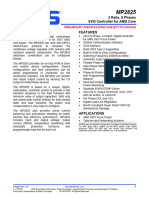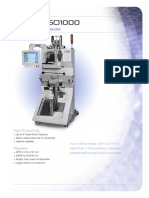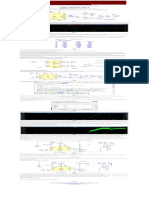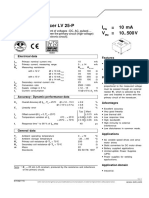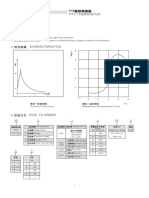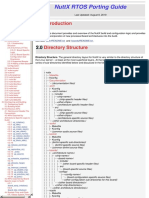0 ratings0% found this document useful (0 votes)
284 viewsOperational Amplifiers-2ed, John Wiley and Sons-Arpad Barna
Operational Amplifiers-2ed, John Wiley and Sons-Arpad Barna
Uploaded by
Gautam BorgohainChapters on stability, frequency response, and transient response were substantially expanded. The results are applied to the latest wideband monolithic and hybrid Operational Amplifiers. The book now has 12 chapters, 132 worked examples, 319 problems, 102 figures.
Copyright:
Attribution Non-Commercial (BY-NC)
Available Formats
Download as PDF, TXT or read online from Scribd
Operational Amplifiers-2ed, John Wiley and Sons-Arpad Barna
Operational Amplifiers-2ed, John Wiley and Sons-Arpad Barna
Uploaded by
Gautam Borgohain0 ratings0% found this document useful (0 votes)
284 views142 pagesChapters on stability, frequency response, and transient response were substantially expanded. The results are applied to the latest wideband monolithic and hybrid Operational Amplifiers. The book now has 12 chapters, 132 worked examples, 319 problems, 102 figures.
Original Title
Operational Amplifiers-2ed ,John wiley and sons-Arpad Barna
Copyright
© Attribution Non-Commercial (BY-NC)
Available Formats
PDF, TXT or read online from Scribd
Share this document
Did you find this document useful?
Is this content inappropriate?
Chapters on stability, frequency response, and transient response were substantially expanded. The results are applied to the latest wideband monolithic and hybrid Operational Amplifiers. The book now has 12 chapters, 132 worked examples, 319 problems, 102 figures.
Copyright:
Attribution Non-Commercial (BY-NC)
Available Formats
Download as PDF, TXT or read online from Scribd
Download as pdf or txt
0 ratings0% found this document useful (0 votes)
284 views142 pagesOperational Amplifiers-2ed, John Wiley and Sons-Arpad Barna
Operational Amplifiers-2ed, John Wiley and Sons-Arpad Barna
Uploaded by
Gautam BorgohainChapters on stability, frequency response, and transient response were substantially expanded. The results are applied to the latest wideband monolithic and hybrid Operational Amplifiers. The book now has 12 chapters, 132 worked examples, 319 problems, 102 figures.
Copyright:
Attribution Non-Commercial (BY-NC)
Available Formats
Download as PDF, TXT or read online from Scribd
Download as pdf or txt
You are on page 1of 142
Operational
Amplifiers
OPERATIONAL
AMPLIFIERS
SECOND EDITION
ARPAD BARNA
University of California
Santa Cruz
and
DAN I. PORAT
Stanford Linear Accelerator Center
Stanford University
Preface
‘This second edition has been extensively revised to reflect new developments
during the 17 years that have elapsed since the publication of the first edition.
‘These include the substantial technological advances that took place, especially
in operational amplifiers with high gain, low input currents and offset voltages,
and high speed. The entire text has been thoroughly revised, and the chapters
fon stability, frequency response, and transient response were consider-
ably expanded and completely rewritten to reflect the vast changes during the
last decade.
‘Chapters 7 and 8 have been most significantly impacted. Chapter 7 describes,
stability criteria and phase margins of feedback amplifies using operational
amplifiers with up to 4 corner frequencies. Frequency-independent feedback, lag
compensation, lead-lag compensation, and lag-lead compensation are treated.
Conditional stability is discussed, as well as limitations characteristic of
inverting feedback amplifiers.
‘Chapter 8 provides a detailed description of frequency response and transient
response of feedback amplifiers using operational amplifiers with up to 3 corner
frequencies. Frequency-independent feedback, lag compensation, lead-lag com-
pensation with and without pole-7ero cancellation, and lag-lead compensation
are treated, including design graphs based on the solution of the third-order and
fourth-order equations that arise, The results are applied to the latest wideband
monolithic and hybrid operational amplifiers in worked examples and in
problems,
‘Two new chapters were also added on applications and on internal structure:
Chapter 11 describes amplifiers with current source inputs, as well as adders,
integrators, diferentiators, and nonlinear circuits; Chapter 12 discusses input
stages, current mirrors, and output stages in operational amplifiers.
‘The book now has 12 chapters, 132 worked examples, 319 problems, 102
figures, and 3 appendixes, Answers to selected problems are also given.
‘We would like (o take this opportunity to acknowledge the contributions of
Wiley Editor George J. Telecki and his associates in making this second edition
a reality
[ARPAD BARNA
Dan I Porat
Stanford, Calyorma
September 1988
You might also like
- MP2825GQKTDocument100 pagesMP2825GQKTryan831022No ratings yet
- Haha User Manual PDFDocument34 pagesHaha User Manual PDFDominicNo ratings yet
- So1000 Rev eDocument2 pagesSo1000 Rev emhafizanNo ratings yet
- RF Power Amp 5w Mighty Mike n1hfxDocument2 pagesRF Power Amp 5w Mighty Mike n1hfxRicardo MorimNo ratings yet
- Power Systems-On-Chip: Practical Aspects of DesignFrom EverandPower Systems-On-Chip: Practical Aspects of DesignBruno AllardNo ratings yet
- Wireless World 1990 01 PDFDocument92 pagesWireless World 1990 01 PDFMilton Nast100% (1)
- DCD300 ServoamplifierDocument31 pagesDCD300 ServoamplifierPaun Al100% (1)
- 500w, Class e 27.12 MHZ Amplifier Using A Single Plastic MosfetDocument7 pages500w, Class e 27.12 MHZ Amplifier Using A Single Plastic MosfetalekssmittNo ratings yet
- WatimetroDocument11 pagesWatimetroLuis Enrique Castillejo GonzalesNo ratings yet
- Power Solutions GuideDocument60 pagesPower Solutions Guidetheodoiq100% (1)
- Ltspice Tutorial: Part 3: Send Mail To: With Questions About This Site SitemapDocument1 pageLtspice Tutorial: Part 3: Send Mail To: With Questions About This Site SitemapshrikrisNo ratings yet
- That1510p PDFDocument6 pagesThat1510p PDFJefferson Gutama ValladaresNo ratings yet
- PFC 5kw V2Document27 pagesPFC 5kw V2Roby JackNo ratings yet
- LV 25P VoltageTransducerDocument3 pagesLV 25P VoltageTransducerJakdaksh HarshNo ratings yet
- Vogel LowNoiseBJT PDFDocument4 pagesVogel LowNoiseBJT PDFAnonymous AaLl1JEqNo ratings yet
- Philips 40pfl3505df7 Chassis Pl10 5Document87 pagesPhilips 40pfl3505df7 Chassis Pl10 5latino52No ratings yet
- Electric Machinery - A. E. Fitzgerald, C. Kingsley and S. D. UmansDocument36 pagesElectric Machinery - A. E. Fitzgerald, C. Kingsley and S. D. Umansgörkem100% (1)
- Logic FamiliesDocument5 pagesLogic FamiliesMuhammad FitriNo ratings yet
- 1 Transistor FM RadioDocument7 pages1 Transistor FM RadiopalakqNo ratings yet
- Wein Bridge Oscillator CircuitDocument3 pagesWein Bridge Oscillator CircuitIndhu k100% (1)
- Module 21 - Circuit SimulationDocument17 pagesModule 21 - Circuit Simulationabeat_1No ratings yet
- Analog ElectronicsDocument12 pagesAnalog Electronicsvc_mpNo ratings yet
- SMPS Trainer Kit ComputersDocument1 pageSMPS Trainer Kit ComputersChandrakant ChatterjeeNo ratings yet
- MotorolaDocument15 pagesMotorolaRecep IvedikNo ratings yet
- 32 MicroprocessorsDocument3 pages32 MicroprocessorsTilak Raj100% (1)
- Computer Hardware Software Installation and CustomizationDocument88 pagesComputer Hardware Software Installation and CustomizationTheo NdedaNo ratings yet
- Fiber Weave Effect - Practical Impact Analysis and Mitigation StrategiesDocument23 pagesFiber Weave Effect - Practical Impact Analysis and Mitigation StrategiesasdNo ratings yet
- Aa3Rl - Transmission Line Calculator: Input Data: Output DataDocument5 pagesAa3Rl - Transmission Line Calculator: Input Data: Output DataNd ReyesNo ratings yet
- PTC MZ72-9RMDocument3 pagesPTC MZ72-9RMelnegromerca100% (1)
- AN1303 A Simple 4-20 Ma Pressure Transducer Evaluation BoardDocument8 pagesAN1303 A Simple 4-20 Ma Pressure Transducer Evaluation BoardFadilla El HuSnaNo ratings yet
- Datasheet 98-91000-0 enDocument58 pagesDatasheet 98-91000-0 enjadadNo ratings yet
- SRD Pulse GeneratorDocument14 pagesSRD Pulse GeneratorraineymjNo ratings yet
- Sony kdl-46x4500 kdl-55x4500 Chassis Eg1h Taiwan PDFDocument60 pagesSony kdl-46x4500 kdl-55x4500 Chassis Eg1h Taiwan PDF高立璋No ratings yet
- Resistive Circuits: Chapter 3 in Dorf and SvobodaDocument47 pagesResistive Circuits: Chapter 3 in Dorf and Svobodaananzo3biNo ratings yet
- Kibwana High Power AmpleDocument1 pageKibwana High Power AmpleDaniel OfoeNo ratings yet
- Modbus TCP ArduinoDocument4 pagesModbus TCP ArduinoLâm DũngNo ratings yet
- C What Happens EbookDocument192 pagesC What Happens EbookIzhar Rosli100% (1)
- Nuttx Porting GuideDocument77 pagesNuttx Porting GuideluizmataNo ratings yet
- Windows Driver FoundationDocument873 pagesWindows Driver FoundationОлег ГаркушенкоNo ratings yet
- Conducted EMI Simulation of Switched Mode PDFDocument6 pagesConducted EMI Simulation of Switched Mode PDFPrabhu KumaraswamyNo ratings yet
- PG DV250Document14 pagesPG DV250admirduNo ratings yet
- HP LaserJet 4L - 4P Service ManualDocument306 pagesHP LaserJet 4L - 4P Service ManualimakingtxNo ratings yet
- Analog Simulation Manual - 2Document72 pagesAnalog Simulation Manual - 2mefortruthNo ratings yet
- Delay 1.0K Millis 2.3K Micros 1.0K Delaymicroseconds 359 Analogwrite 274 Tone 1.4K Notone 76 Servo Library 1.6KDocument11 pagesDelay 1.0K Millis 2.3K Micros 1.0K Delaymicroseconds 359 Analogwrite 274 Tone 1.4K Notone 76 Servo Library 1.6KOthmane Bouzarzar100% (1)
- Jump, Loop and Call Instructions: University of Engineering and Technology TaxilaDocument93 pagesJump, Loop and Call Instructions: University of Engineering and Technology TaxilaPraneetha InumarthiNo ratings yet
- PracticalElectronics1967Oct TextDocument84 pagesPracticalElectronics1967Oct Textdonkey slapNo ratings yet
- 1972 Signetics Linear Vol 1Document242 pages1972 Signetics Linear Vol 1iimro20032765100% (1)
- The Operational Amplifier and Applications.: Chapter IiiaDocument30 pagesThe Operational Amplifier and Applications.: Chapter IiiavnkrishNo ratings yet
- 276 Penfold Short Wave Superhet Receiver ConstructionDocument84 pages276 Penfold Short Wave Superhet Receiver ConstructionVijayakrishnan SNo ratings yet
- Manual ' (6 (59, d2: DVD Home Theatre SystemDocument92 pagesManual ' (6 (59, d2: DVD Home Theatre SystemRamanujar DasanNo ratings yet
- FINALDocument53 pagesFINALnasifjanjuaNo ratings yet
- TV TransmitterDocument5 pagesTV TransmitterAndra DorNo ratings yet
- Digital Electronics 2: Sequential and Arithmetic Logic CircuitsFrom EverandDigital Electronics 2: Sequential and Arithmetic Logic CircuitsRating: 5 out of 5 stars5/5 (1)
